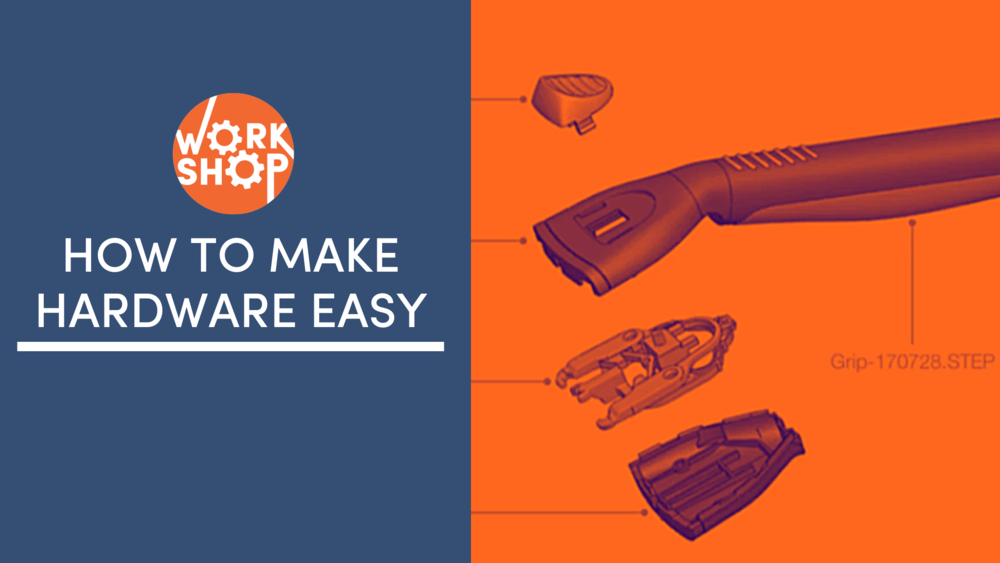5 Things We Learned from #VCWorkshop | How to Make Hardware Easy

There’s no getting around it. The hardware product space is hard. Entrepreneurs in product development can’t know all of the challenges that lay ahead, but they can learn how to be prepared for anything. Here are a few highlights from a recent #VCWorkshop, where product development experts Torence Lu of Spanner Product Development and Scott Zenker of Harry’s joined us to advise entrepreneurs on making hardware a little easier.
-
Start with a consumer truth
In other words, is the product you want to develop solving a problem or fulfilling an unmet need? If you have an idea for something that looks cool but isn’t particularly useful or needed, it might be time to go back to the drawing board. Your consumer truth will lead you to the best ideas and keep you on the right track down the line when things get complicated. For Harry’s, the consumer truth is that buying razors is expensive and inconvenient. Everything the brand has become was born from, and ladders back towards, that initial consumer truth.
*Quick tip for understanding your customers: Read Amazon reviews of competing products to find out what people love and hate about similar hardware!
-
Don’t take shortcuts
One significant difference between developing hardware and software is that there’s no such thing as a minimum viable product when talking about physical products. The last thing you want to do is spend a lot of time and money manufacturing products you and your customers aren’t thrilled with. Remember that you don’t have a brand if you don’t have a functional product, so make sure you spend the time upfront to get your hardware right.
-
Build a network with expertise and trust
No one can do this alone. You will need all kinds of teammates and partners, so make sure you build good relationships. That means your network consists of partners you trust and who trust you in return. Once you have your network in place: listen to them. An essential part of an entrepreneur’s work is knowing where your expertise ends, seeking out people who can fill in the gaps, and allowing the experts you’ve partnered with to guide you.
Sometimes the “can-do” attitude of people who become entrepreneurs can be a double-edged sword. Practicing humility and learning from others is key to the success and well-being of everyone involved. Consider carefully where your time and energy are best invested, and let others take the lead in other areas.
-
Budget extra time and money, then budget more on top of that
“Fast” in hardware doesn’t mean the same thing as “fast” in software. While much of the language is the same, especially in startups, words and phrases like “sprints,” “build quick to fail fast,” “agile,” etc., look very different in practice. While software timelines look like weeks or even days, you will deal with months and years in hardware.
When it comes to budgeting time and money for your project, think of it as you would think about building a house or a remodel. Everything is more expensive and time-consuming than you think it will be, and there will always be hiccups along the way. Build extra time and money to allow for these things to happen. Plus, go ahead and prepare your answer for the question you will regularly field: why is the timeline so long?
*Quick tip for helping with the timeline: Think from the beginning about manufacturing feasibility at the end. Building one prototype that works doesn’t necessarily mean you’ve got a product that can be manufactured at scale. Ask your suppliers good questions from the get-go about their needs, and you will save time and money working kinks out at the end.
-
Find your North Star
Success has as many definitions as there are people. When it comes to your hardware venture, take time to consider your definition of success carefully. What will make it or break it for you? Once you define this key success criterion, it can become a sort of North Star to guide you and your team at every stage of your project. Things will get difficult, confusing, and overwhelming at times. It will help you and everyone you work with to have a solid understanding of what, exactly, you are trying to achieve to turn to in times of uncertainty.
Remember, everyone making hardware (or virtually anything) is trying to balance three things: Development schedule (how fast you can get your “thing” to market), cost (to you and to your consumer), and features. Of those three, get comfortable with the fact that you can only pick two!
Don’t forget to think about what happens after you meet your initial goal. Instill a growth mindset into your team culture and workflow from the start. That means building a runway to improve your product or experience continuously. Who knows where it could take you? The sky’s the limit, but only if you create a way to get there.
You can still watch the entire workshop here to see our experts expand on all of these tips and more!
Huge thanks to Torence Lu, Co-owner and Director of Silicon Valley product design studio Spanner Product Development and Scott Zenker, Head of Commercialization for global direct-to-consumer shaving company Harry’s for joining us for this installment of #VCWorkshop! VC Workshops are free online events where the Venture Center brings subject matter experts to you to explain the nitty gritty of entrepreneurship, offer hard-won advice, and answer your burning questions. Sign up for the VC Newsletter to always get the heads-up on upcoming events!
